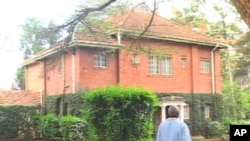Real estate prices in Kenya's capital have doubled, even tripled, in the past few years, and the government wants to know why. Investigators are looking into possible ties to Somali pirates.
Volatile, lawless Somalia, where, last year, the International Maritime Bureau says pirates hijacked 47 ships and kidnapped 867 crewmembers.
Meanwhile, in neighboring Kenya, property values are soaring.
Mwongela Munyoki is a real estate appraiser with Munyoki and Associates.
"We are seeing a situation or experiencing a situation where property that was once worth four million shillings is now worth eight, nine, even 10 [million] and they are buying. So there is that influence of that kind of funds coming into the country," Munyoki noted.
Government spokesman Alfred Mutua says he sees a connection between what is happening on the Somali high seas and the price increases of property being purchased by those he calls "foreigners."
"They are coming and they are buying the property at any price," said Mutua. "So, they are coming to a person and asking them, 'How much is this piece of land?' The person says, 'Oh, I am sorry, this piece of land or this building is already sold for $50,000,' and then they say, 'OK, we will give you double and we will pay cash.'"
Piracy has increased dramatically over the last four years ago. Some estimates say pirates collected more than $100 million in ransoms in the last two years alone.
The London-based think tank Chatham House says money raised from pirate activities is helping to pay for Somalia's continuing conflict, and supports al-Shabaab, the al-Qaida-linked militia in Somalia.
That money is also being invested in the real estate market in Kenya, particularly in an area of the city called Eastleigh, which boasts a huge Somali population. And those knowledgeable about property in Eastleigh say some 65 percent of the shopping malls, hotels, condominiums and other buildings that have gone up over the past few years have been built with pirate money.
A source close to the pirates tells VOA that a single, 10-man pirate team can bring up to $3 million to the Nairobi real estate market each year.
The source explains that the money is invested through clan members of the pirates, most of whom are Kenyan citizens.
Government spokesman Mutua says Kenya is taking steps to monitor the real estate market.
"So if we get somebody who is a front, a young Kenyan man who is a front, he will need to tell us that, you own this building, you have been unemployed or used to work as a driver, where do you get $2 million from if you did not steal it? Did you rob a bank? That way we will catch the real owners of the building and trace the money, and find out where the money is coming from," added Mutua.
But the head of the Eastleigh District Business Association says the pirate connection to Nairobi real estate is exaggerated. Hassan Guleid says the influx of Somalis into Eastleigh started before piracy became a problem.
"There was now a high demand for space and people were now thinking of definitely buying empty land and as the demand went up the prices also shot up," explained Guleid. "It is very, very true that it skyrocketed, and the pirates I think came at the end of 2007-2008. By then, most of those buildings were there."
Guleid says he thinks crackdowns on Somalis by the Kenyan government are meant to discriminate against the Somali community and divert attention away from Kenyan government corruption and other controversies.











